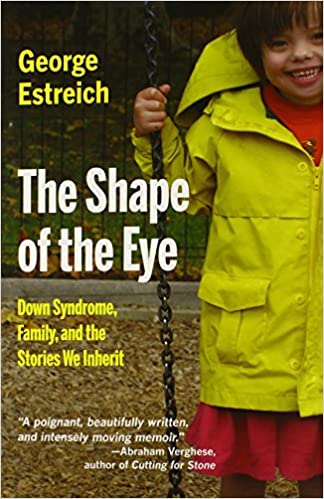George Estreich
When Laura Estreich is born, her appearance presents a puzzle: does the shape of her eyes indicate Down syndrome, or the fact that she has a Japanese grandmother? In this powerful memoir, George Estreich, a poet and stay-at-home dad, tells his daughter's story, reflecting on her inheritance --- from the literal legacy of her genes, to the family history that precedes her, to the Victorian physician John Langdon Down's diagnostic error of "Mongolian idiocy." Against this backdrop, Laura takes her place in the Estreich family as a unique child, quirky and real, loved for everything ordinary and extraordinary about her.
Jennifer Margulis on Goodreads wrote:This is a book from the world of the imperfect child, a world in fact home to all of us. Estreich has written of his daughter who has Down Syndrome. At first it seems as if he has written about the impossible experience, the terror of the few. Laura indeed has a harrowing start. She survives major and complex heart surgery with all the complications such a condition implies. Very potent to me was his wife's instinctive shrinking from the use of a feeding tube. In her loneliness, she felt Lauara would turn away from eating by mouth. Unhappily being right, their next challenge was to convince Laura to eat. Medical trauma hovers on the sidelines in the life of a child with this mutation. But the book rapidly becomes a story of their child. She is a child who needs to live in the world and to be seen as part of it.
First I must say that I do admire and respect the writing in this book. Estreich starts his book a bit flowery for me. This is a very personal preference. The line between prose and poetry is liminal, and he is a poet. The task for a memoir, in my opinion, is to put the spirit and the story of the heart into prose. And Estreich very quickly crosses back to form successfully. He is able to convey the tone and the struggle of his experiences accurately and empathetically. For many people living in the world of illness, the struggle is to convey the reality to those in the world of health. He himself notes that struggle for himself. He also portrays that difficult bridge in entering daily life with the wishes and the dreams for his child. He is able to write without pathos or melodrama, which is a skill I hold dear.
I would not limit my recommendation of this book to those dealing with Down Syndrome or those wishing to understand it. I also think it makes many lovely points about the child beneath any label.
"What will become of them?" George Estreich asks of his two daughters. "What will happen, as Ellie becomes an adult? Will Laura follow her to college? Will she live with us? Will Ellie live close by or far away? What will happen after we are gone? We don't know. We save, prepare, forge the links we need to forge, keep our expectations high. Beyond that, we cannot say, but then, we cannot say with any child. Anything can happen. We do what we would do if they had the same number of chromosomes: we try to prepare them for the future we do not know." While any parent--whether you have a special needs child or not--can appreciate these kinds of questions and the struggle George and his wife Theresa go through in raising their daughters, I had to force myself to read this entire book. I found the author's relentless musings on himself as a (lapsed) poet, his strained and unhappy relationship with his Japanese-born mom, and on Down syndrome as a philosophical, biological, and social construct tiresome. The book dragged for me. It felt like Laura, his second daughter who has Down syndrome, was missing from the story. I wanted her to come to life on the page the way the narrator kept saying she was alive: as an individual. I wanted more scenes of real life and less expository prose and reflections on meaning. I appreciate the subject tremendously. But it was presented in this book in a way that made me impatient and wishing for more.





Leave a Reply